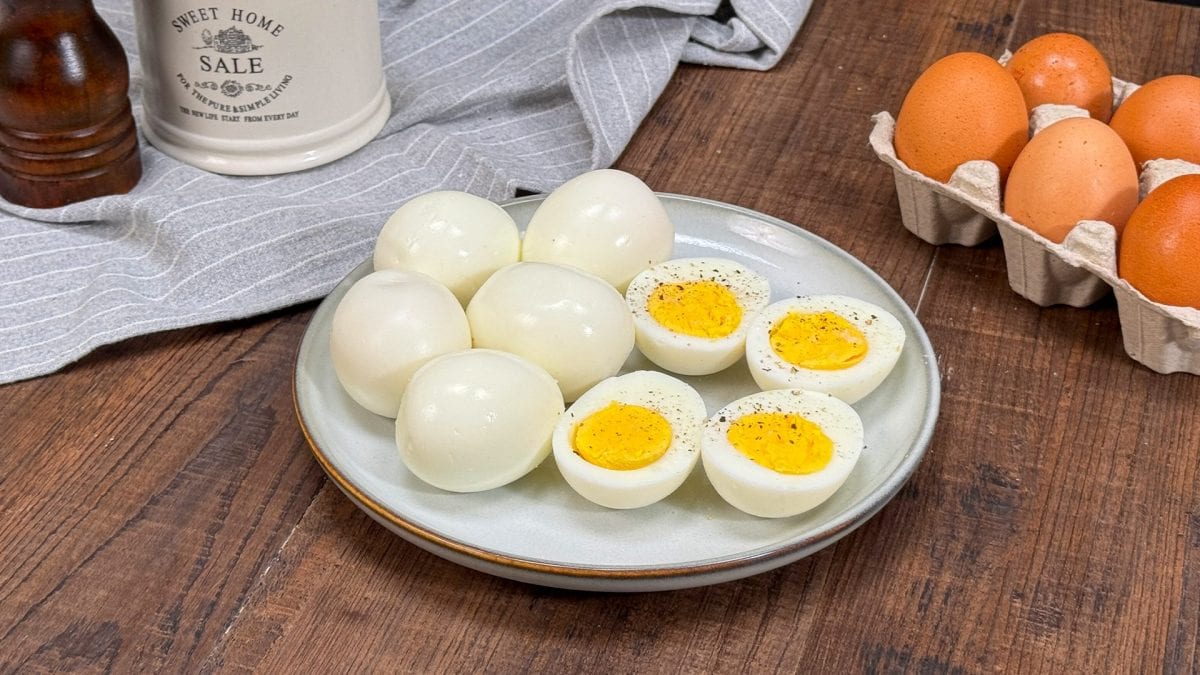
Hard-Boiled Eggs are a timeless favorite, whether enjoyed as a snack, added to salads, or transformed into a creamy deviled egg filling. The secret to perfectly cooked eggs lies in the method. With this foolproof guide, you’ll achieve the ideal hard-boiled eggs every single time—easy to peel, with no green ring around the yolk. Follow these simple steps and become an egg pro!
Pro Tips for Perfect Hard Boiled Eggs: Secrets to Easy Peeling and Flawless Results
Achieving the perfect hard-boiled egg is all about timing and a few key tricks. Follow these tips for smooth, easy-to-peel eggs every time:
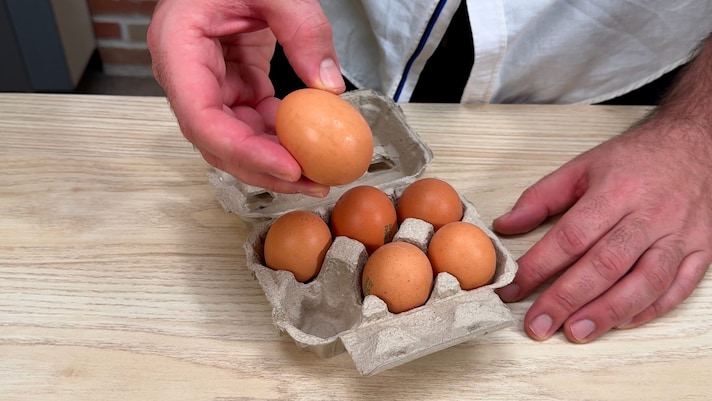
- Use Older Eggs: Fresh eggs are a nightmare when it comes to peeling. They tend to stick to the shell, making the peeling process frustrating and messy. Try using eggs that are at least a week old for the best results. As eggs age, the pH level in the whites increases, which helps prevent them from sticking to the membrane inside the shell. So, next time, reach for the carton that’s been sitting a little longer in the fridge!
- Add Vinegar to the Water: Adding just 1 tablespoon of vinegar to the boiling water helps the egg whites set more easily if the shell cracks. The vinegar also slightly softens the eggshell, making it easier to peel. Don't worry—it won’t affect the flavor of the eggs at all! The acid in the vinegar reacts with the calcium in the eggshell, preventing cracks from spilling egg white into the water and ensuring a smooth finish.
- Avoid the Cold Fridge-to-Pot Shock: Taking eggs directly from the fridge into hot water can lead to cracks from thermal shock. Let your eggs come to room temperature by leaving them out for 10-15 minutes before cooking. This step helps prevent cracks and ensures an even cooking process, leading to beautifully smooth eggs.
- Watch the Timer: Timing is key. Overcook the eggs and you'll end up with a greenish ring around the yolk, which is both unappetizing and a sign of overcooking. For medium-sized eggs, 8–9 minutes is the sweet spot for fully cooked yolks with firm whites. For larger eggs, aim for 9–10 minutes. Adjust the cooking time based on your preference for yolk firmness—8 minutes for a creamy yolk, and 9 minutes for a fully set center.
- Chill in Ice Water Immediately: Once the eggs are done cooking, immediately transfer them to a bowl of ice water. This rapid cooling stops the cooking process and helps prevent the yolk from turning overcooked. The ice bath also makes peeling the eggs much easier by contracting the egg whites slightly, pulling them away from the shell.
Should You Start Boiled Eggs in Hot or Cold Water?
When it comes to boiling eggs, you may wonder whether it’s better to start with hot or cold water. The answer depends on your preferred method, but the most common recommendation is to start with cold water. This gradual heating helps the eggs cook more evenly and reduces the chances of cracking from thermal shock. By placing the eggs in cold water and then gradually bringing it to a boil, you give the eggs time to warm up slowly, which results in a smoother cooking process. On the other hand, starting with hot water can lead to uneven cooking or cause the eggs to crack due to the sudden temperature change. Therefore, for the most consistent results, it’s best to start with cold water.
Frequently Asked Questions
How Long Do I Boil Hard Boiled Eggs for?
For medium eggs, boil for 8–9 minutes for a perfect firm yolk. Adjust slightly for larger eggs—9-10 minutes should give you that solid, fully-cooked consistency.
Can I Use This Method for Different Egg Sizes?
Absolutely! This method works for all egg sizes; just adjust the boiling time: 8–9 minutes for medium eggs and 9–10 minutes for large eggs.
Why Should I Add Vinegar to the Water?
Adding vinegar helps make the eggshell more fragile, making peeling easier. If the shell cracks during cooking, the vinegar helps the egg whites coagulate quickly, preventing any messy spills in the water.
How Do I Peel Hard Boiled Eggs Easily?
After boiling, immediately transfer the eggs to ice-cold water. This halts the cooking process and makes peeling much easier by loosening the shell from the egg whites.
Can I Make Hard Boiled Eggs Ahead of Time?
Yes! Hard-boiled eggs can be made in advance and stored in the fridge for up to a week. Perfect for meal prep, quick breakfasts, or packed lunches.
How to Store
Store leftover hard-boiled eggs in their shells in the refrigerator for up to 1 week. If peeled, place them in an airtight container and use them within 2 days. To reheat, simply immerse the egg in hot water for 2-3 minutes—this warms the egg without overcooking it.
How to Freeze
Freezing hard-boiled eggs is not ideal due to the texture changes in the whites.
Ingredients
How To Make Perfect Hard Boiled Eggs
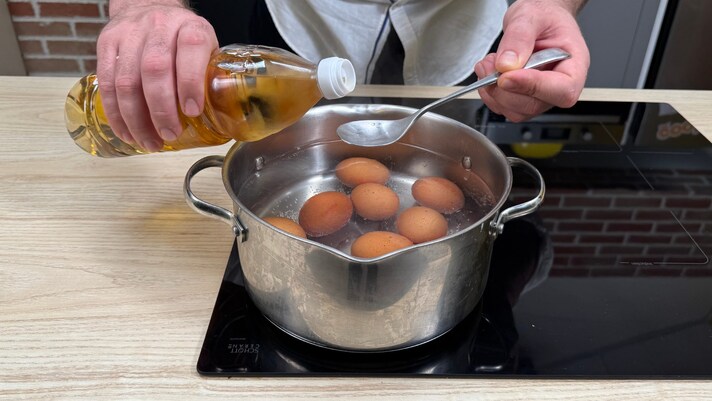
Let the eggs sit out for 10-15 minutes to bring them to room temperature. Fill a pot with enough water to cover the eggs and add 1 tablespoon of vinegar. Bring the water to a boil. Gently lower the eggs into the boiling water. Reduce the heat slightly to maintain a gentle boil.
Let the eggs sit out for 10-15 minutes to bring them to room temperature. Fill a pot with enough water to cover the eggs and add 1 tablespoon of vinegar. Bring the water to a boil. Gently lower the eggs into the boiling water. Reduce the heat slightly to maintain a gentle boil.
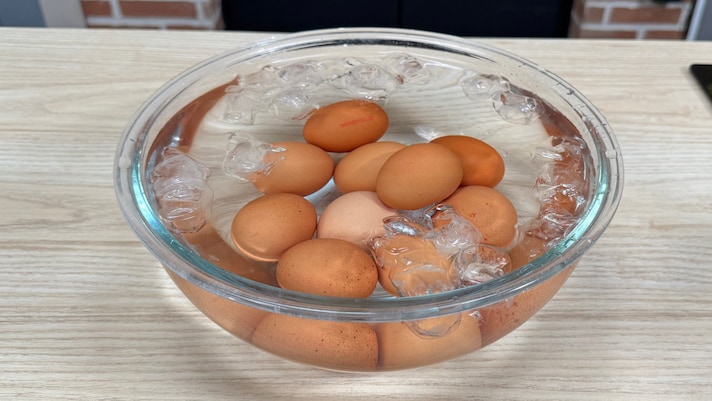
For medium eggs, boil for 8-9 minutes for perfect yolks. Adjust time for larger eggs. Once cooked, transfer the eggs to ice-cold water for 5-10 minutes.
For medium eggs, boil for 8-9 minutes for perfect yolks. Adjust time for larger eggs. Once cooked, transfer the eggs to ice-cold water for 5-10 minutes.
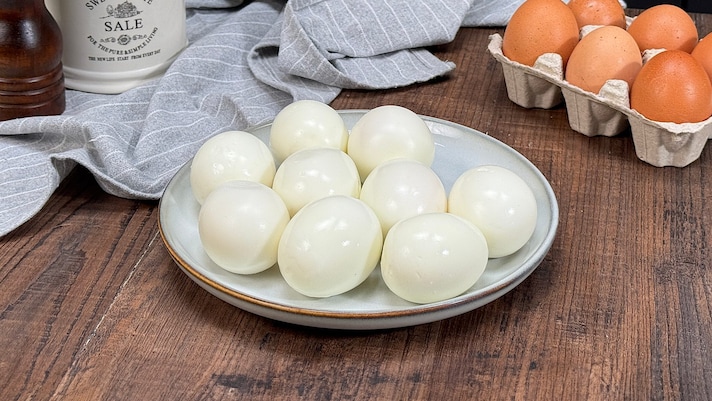
Gently tap the eggs to crack the shell, peel, and season with salt and pepper.
Gently tap the eggs to crack the shell, peel, and season with salt and pepper.

;Resize,width=767;)
